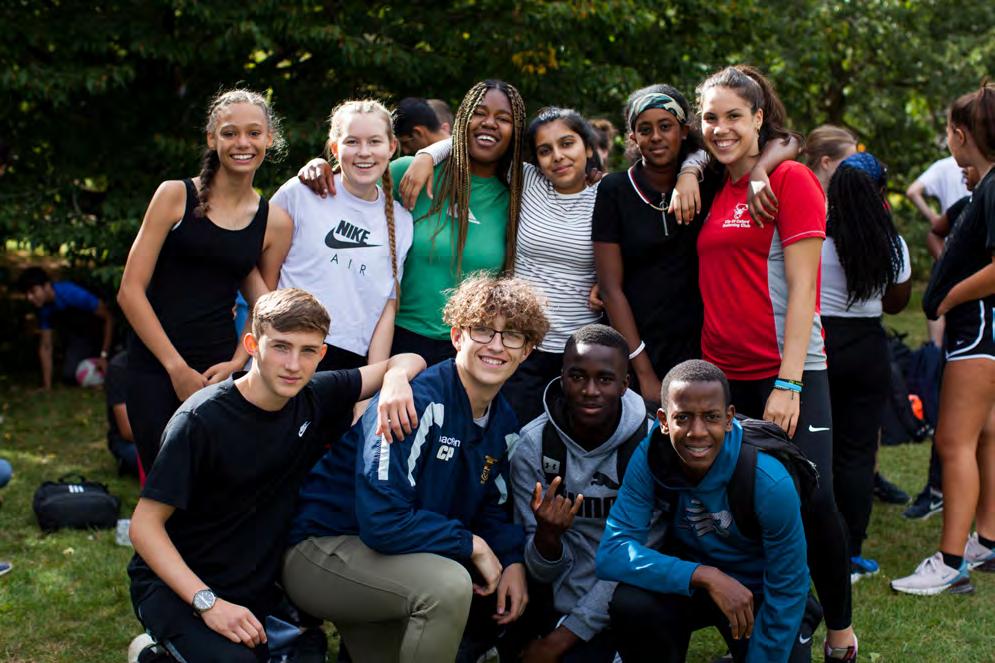
2 minute read
Who we support
OUR PARTICIPANTS ARE YEAR 10 STUDENTS FROM NON-SELECTIVE STATE SCHOOLS, WHOSE BACKGROUNDS ARE UNDER-REPRESENTED AT HIGHLY-SELECTIVE UNIVERSITIES
A key part of what makes Universify unique is who we work with. Our participants are GCSE students from disadvantaged backgrounds, starting in Year 10 and continuing throughout Year 11. Most other access and outreach programmes start in Year 12, but by that point many young people have already made decisions about their future, or have under-performed at GCSE, and so would be unable to make a competitive application to a highlyselective university. By starting earlier, we have the chance to raise participants’ attainment at GCSE. We are also able to create a pipeline with other widening participation providers so that students get the most support possible to help them to succeed, increasing the sector’s effectiveness and maximising our impact.
Advertisement
When selecting participants for our programme, we look for students from disadvantaged backgrounds who have a passion for academia but who are at risk of not fulfilling their full potential. We work with students who face disadvantage in many different forms, but particularly socio-economic disadvantage, as research shows that this is a key barrier in attending university. Therefore, we prioritise applications from students eligible for Free School Meals (FSM) and Pupil Premium. In 2020-2021, 72% of Universify participants were eligible for FSM at some point in the last six years (Pupil Premium), which is a marked increase on the previous two years and is comparable to the proportion for our first two cohorts, which were much smaller than Cohort 5. The majority of Cohort 5 (53%) were currently eligible for FSM, a significantly higher proportion than we have had since Universify was founded in 2016. This shows that we have been able to expand student numbers each year while working with more students whose backgrounds mean they are at risk of not fulfilling their potential in education.
Additionally, we work with students who would be the first generation in their family to attend university, as a lack of family members with experience of university can limit both understanding of and aspirations to university. Almost three-quarters of Cohort 5 (73%) would be the first in their family to go to university. By working with these students, our programme has the potential for greater impact and enhanced social mobility, by improving not just the participant’s understanding of university, but also that of their wider family (for example, younger siblings).
Our selection process is further contextualised using teacher statements. These give us more detail on other reasons why a student may be at risk of not fulfilling their potential, including nonsocioeconomic circumstances such as being careexperienced or a Looked After Child (LAC). Teachers also confirm participants’ potential to achieve the GCSE grades required to make a strong application to highly-selective universities.
In August 2020, we worked with four partner colleges at the Universities of Oxford and Cambridge to run five online courses, with a total of 167 participants completing our summer course. While we had hoped to expand the course by 50 in 2020, our growth was limited by a higher-thannormal drop-out rate which we have attributed to moving some of the course online in response to the Covid pandemic.
41% of our fifth cohort came from areas with postcodes in the two most deprived deciles, according to the Index of Multiple Deprivation. In other words, two fifths of our participants came from the poorest 20% of neighbourhoods. When considering geographical participation in Higher Education, 28% of participants came from areas with the lowest participation rates in Higher Education, a slightly lower proportion than we had last year (POLAR4). Although we use POLAR to provide additional insight into participant backgrounds and the barriers they may face, we do not currently select students based on POLAR.









